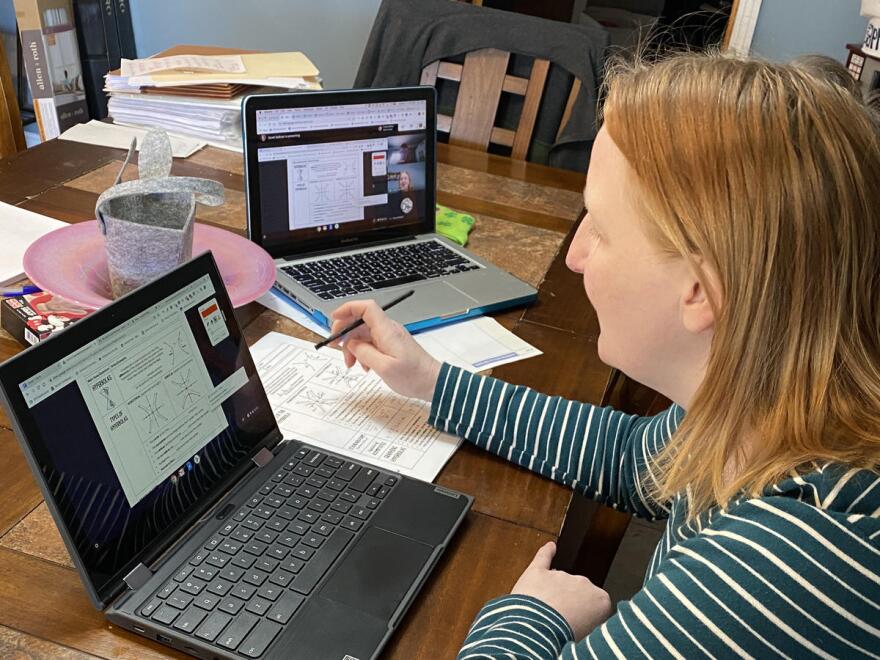With the coronavirus forcing schools across Kentucky, and the nation, to shut down, educators are being pushed into new territory.
A husband and wife, both teachers in Owensboro Public Schools, are expanding the boundaries of the classroom to keep students engaged while they’re learning at home. Sarah and Joshua Sullivan are among thousands of teachers across the U.S. who are creating the new reality for education in this unusual time.
When it became clear that Owensboro Public Schools would close down to prevent the spread of the coronavirus, sixth grade social studies teacher Joshua Sullivan said educators leaped into action.
“The school district actually set up Google Classroom to have special NTI classes,” said Sullivan, who teaches at Owensboro Middle School.
NTI stands for Non-Traditional Instruction, when learning continues during a time when school is out. Before the pandemic, that was usually for snow days. NTI days don’t have to be made up at the end of the school year. The last day of classroom instruction for Owensboro Public Schools was Friday, March 13. All district students in grades 6-12 have a Chromebook, but administrators know that about 12 percent of students don’t have internet at home.
So with educators preparing 10 days of lessons at a time, Sullivan said they made the most of the getting the materials to the students while they were still in school.
“We had a very simple three- or four-step process during the school day that all the kids did on their computers,” he said. “It downloaded everything onto their computer, so they could access those 10 days’ worth of lessons without internet.”
Joshua Sullivan said videos are one of the important tools teachers use now.
“I have videos that they could watch, that kind of walks them through democracy in ancient Greece, and how it was different than the democracy we have here,” he said. “Here’s a five- or six-minute video clip, it’s downloaded to their computer. They could be anywhere and watch that video.”
Although he's creating his own video lessons, Sullivan said he misses what he can offer in the classroom.
“You know, it’s harder for me to check if the kids know what they’re doing and that they understand things," he said. "It’s easier when I can stand up in front of the class and talk about it, demonstrate it, walk them through it. And here I don’t necessarily have that option.”
“Here” for Joshua Sullivan now means working in the game room of the home he shares with his wife, teacher Sarah Sullivan, and their five-year-old daughter.
They’ve turned the kitchen into an office where Sarah Sullivan teaches her advanced math students from Owensboro Middle School and her Algebra II class from Owensboro High School.
Sarah Sullivan said she’s adjusted the schedule to make it more convenient for students to join the online classes.
“Right now, teachers are just expected to work from 9:00 to 2:00. Of course, we’re working way beyond that just getting things ready. That’s the time period we’re to be available to students," she said. "Some of my classes would have started at 7:30. Well, I’m trying not to start any classes at 7:30. I don’t think my high-schoolers are out of bed until 1 o’clock.”
She uses Google Meet video conferencing to teach “live” classes.
“We utilize a text message system that had been set up at the beginning of the year. It’s called Remind," she said. "So I usually send them a text that says, 'Hey, I’m sending you the Google Meet link'.”
Joshua Sullivan has about 90 students in his four social studies classes. In this unusual time, he believes it’s important to reach out and connect with students and their families.
“When you’ve got 90 kids, it’s hard to contact everybody, but my wife and I both called some of our students and said, ‘Hey, how’s it going?’ and ‘What can we do to help you? Do you need anything?" he said. "We got good response from the parents. They were pretty happy that we were reaching out like that.”
Joshua Sullivan said teaching without a classroom does make him consider the nonacademic parts of being an educator.
“I want to make sure that my kids have everything they need. My biggest concern is not with the social studies content, but ‘Do you have food today?’ ‘Are you safe?’ ‘What can I do to help you if you need anything?’ he said. "Luckily, so far, we haven’t had any issues.”
For now, technology is the vital link that allows students and teachers to continue the academic year. But there are elements of being in a classroom, in-person, that just are not the same over a computer screen.
People like you value experienced, knowledgeable and award-winning journalism that covers meaningful stories in Central and Eastern Kentucky. To support the content you depend on, please make your contribution to WEKU today.







